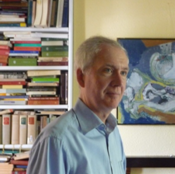"In order to incite the people, the heretics made all their preachers preach that the emperor wanted to take away all the privileges of their religion."
The writer is an anonymous informer in the Imperial court in Vienna, and his weekly account, obviously partial to his Catholic audience, reached the Grand Ducal court and who knows where else, before eventually ending up among the papers in the Medici collection in Florence. I’m looking for the origins of news reporting in the sixteenth and seventeenth centuries; and I’m immersing myself in handwritten newsletters about what was going to be called the Thirty Years War, fought between 1618 and 1648 with satellite conflicts involving three continents. The account goes on: "Wednesday [23May] they went into the chancery well-armed, and there they read a writing to the [imperial] lieutenants.” What the angry Protestants did next had elements of comedy and tragedy at the same time. “Ulrich Chiazichi grabbed Baron Slavata and threw him out of the windows facing the castle moat . . . and Smergischi seized Baron Sminciaschi and threw this one out too, and then they did the same thing with secretary Philip, a Catholic, and although the first drop is more than 28 1/2 Florentine braccia, and another 14 braccia because they rolled down the bank and were shot at with harquebuses," the three nonetheless survived.
Passions were clearly running high among those holding different beliefs, worried that their salvation might be in jeopardy or that their interests were being ignored. But wait a minute. The second man's name was actually Jaroslav Borsita von Martinitz, not Sminciaschi, I seem to recall from the textbooks. Clearly the last word wasn't yet in. Nor could anyone imagine that war would soon break out.
But the event now known as the Defenestration of Prague is only one of myriads of events and pseudo-events recounted in these time-worn pages, and trying to understand the experience of early news as it happened around Europe at the time seems a massive task. There is a temptation to revert to the standard images of people falling on to piles of stones or (according to another now-famous version) piles of turds; but I want to see events afresh from the eyes of contemporaries, and compare the (then) newly-invented printed newspapers in other archives before I draw my conclusions. True or false, information is the vital DNA of every society, as the reaction to thinly veiled threats of violence against the press made by current political leaders in supposedly free countries has powerfully underscored.
There is a certain urgency to get things done before the Archive’s annual closing on July 31. Fingers type more nervously, polyglot socialization among friends and colleagues seems more furtive.
I move on to a story about a terrible storm in Catalonia in the previous January evidencing an acute cycle of not yet anthropogenic climate change.
The busy season is just warming up, and I'm hoping I will have enough notes to carry me through the writing stage before my flight back home.......
So stay tuned, there's more on the way!


